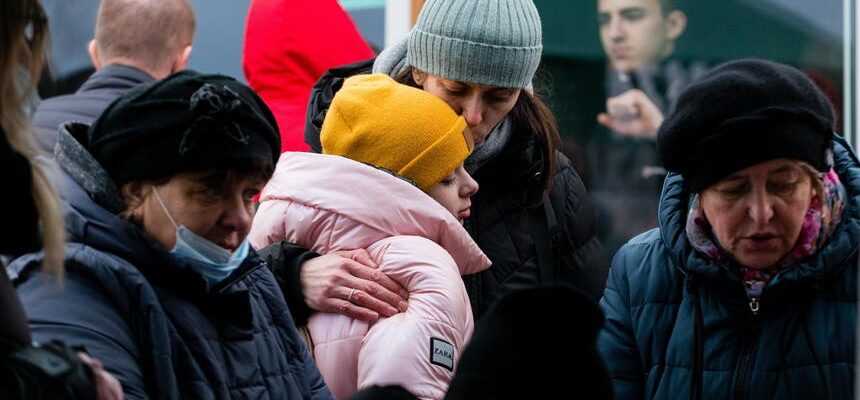Maciek Musialek
More than 100,000 people have already fled to the neighboring country since the Russian invasion began. Polish politics and society are doing everything they can to accommodate them – but the situation is getting worse almost by the hour.
With a delay of three and a half hours, the light blue locomotive and the three wagons arrive at the Przemysl border station. First, the conductor lifts a green pram from the wagon onto platform 4. Then the Ukrainians follow, one after the other. They escaped from the war – from Odessa, Kiev and Lviv. Many only carry light luggage. The refugees disappear into the customs building under the eyes of dozens of police officers, journalists and camera teams. In the Habsburg station building from 1895, they come to rest for a short time, often for the first time in two days.
Katerina Kosar is standing in the reception hall with her daughter Diana and her dog Miki. She left her hometown of Kharkiv at four o’clock on Thursday morning. “My husband said I should go to Lviv for a few days to be on the safe side, since I’m heavily pregnant,” she says. “An hour and a half later the bombs fell.” The 30-hour journey across Ukraine went smoothly, but her husband, a police officer, remained concerned to the last as the train passed through the middle of the war zone. “I barely got out, but family members, friends and neighbors are stuck in bomb shelters.”
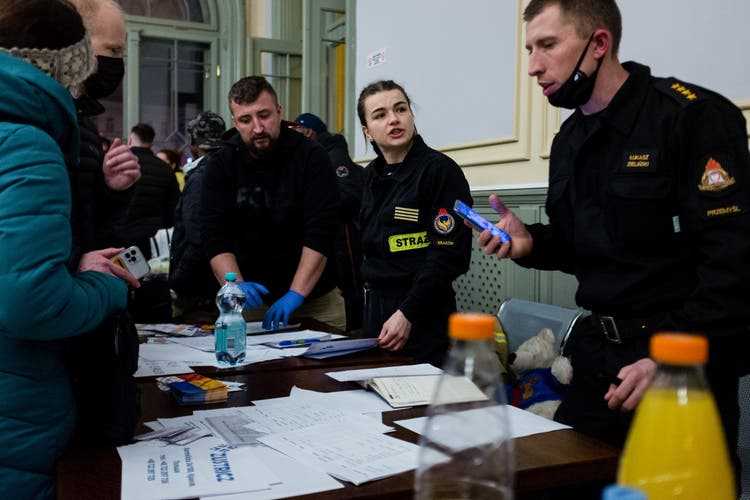
The authorities coordinate onward transport in the reception center at Przemysl main station.
Kosar is tired, sad and shocked like everyone here. But she was lucky – also because a family on the train spontaneously gave her a ticket: the man suddenly couldn’t leave the country after Ukrainian President Volodymyr Zelensky announced general mobilization on Friday. Accordingly, women are in the majority among the arrivals. They say everyone helped each other on the train. Since Friday you can even travel without a ticket. There are other priorities at the moment.
A wave of solidarity in East Central Europe
As Ukrainians flee to the West, they are greeted by a wave of solidarity. Slovakia, Romania and Moldova have opened their borders. Estimates of how many displaced people there are already remain very vague given the confusing situation. The United Nations High Commissioner for Refugees estimated on Friday that at least 50,000 had left Ukraine. However, the border guard reported on Saturday that 115,000 Ukrainians had entered Poland alone. The number of internally displaced persons is likely to be many times higher.
Poland is experiencing an overwhelming moment of welcome culture. The support for the neighbors is huge – politically and socially: the national-conservative ruling party Law and Justice (PiS), which backed thousands of non-European refugees on the border with Belarus in late autumn, is now doing everything it can to cope with the onslaught. These are “real refugees,” said Prime Minister Mateusz Morawiecki, while other government members spoke of “brothers and sisters” who now needed help.
Within a very short time, the Ministry of the Interior set up 9 reception centers along the 535-kilometer border. But for years immigration has been concentrated in Przemysl, which historically has great significance as a border town and was besieged by the Russian army at the beginning of the First World War. Today, almost every restaurant has a sign in the Ukrainian national colors offering free internet and free phone calls to refugees. They collect tips for refugees.
In an interview, Mayor Wojciech Bakun explains that by Friday afternoon 4,000 people had arrived at the train station alone, and 8,000 more at the nearby Medyka border crossing. Since then, tens of thousands have come. In the corridors next to the tracks, the military hands out donuts – after all, Dirty Thursday was celebrated on the day of the invasion – soup, coffee and blankets. The rear part of the building has been converted into a flatbed warehouse. The stern lady, who usually charges 3 zloty for using the toilet, politely waves people in.
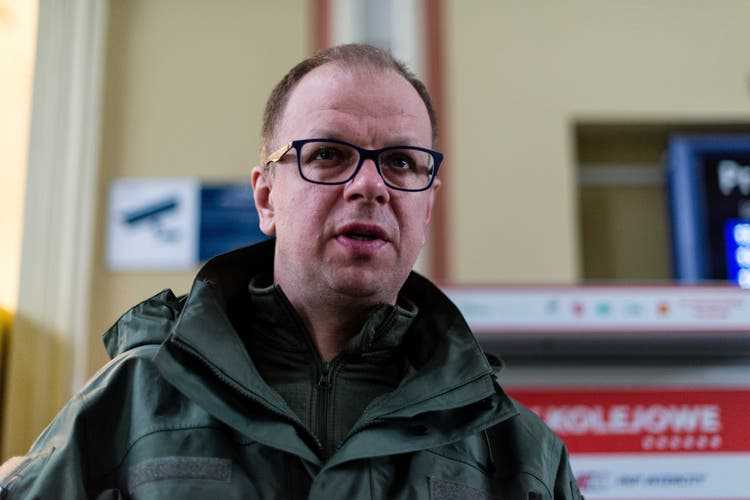
Wojciech Bakun is a member of the national conservative governing party PiS and offers to help the refugees from Ukraine.
Mayor Bakun, also a PiS politician, is present at the relief operation at the main station. “We are the first receiving station,” he explains his understanding of the role. “The people who have arrived so far are tired and disoriented, but mostly healthy.” The regional hospital is equipped to treat the wounded, he assures, and has 1,000 beds. “However, almost everyone travels on straight away. We provide them with warm clothing, tickets and provisions.»
Thousands of volunteers
So far, the authorities have been surprisingly successful in involving the thousands of volunteers who have gathered at the border practically overnight. At the Medyka crossing, the number of private cars and buses increased almost hourly over the course of Friday evening, with the police having to try to keep the entrances free. The vehicles are parked in fields, in underpasses and next to the road, the rest of the way to the border has to be covered on foot.
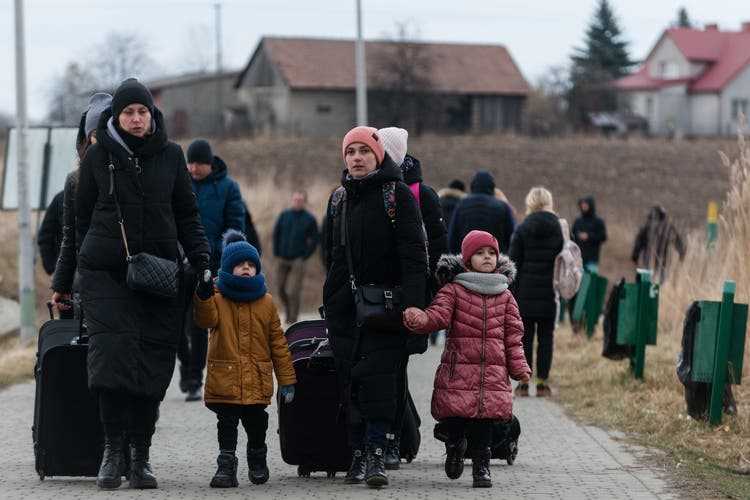
Numerous refugees from Ukraine arrive in Poland.
The refugees from Ukraine, who have come on foot from western Ukraine, visibly exhausted, seem almost overwhelmed by their willingness to help: there are people everywhere with handwritten signs saying “free transport”. Among the destinations offered are Warsaw, Poznan and even Berlin.
Dmitri Galai and Valery Bogdanov want to take people to Kraków. You come from Belarus, Bogdanov used to work in the IT sector in Switzerland, and Galai fled Lukashenko’s wave of repression to Poland in 2020. “I understand how difficult it is for Ukrainians right now. We are here to help.” Three colleagues have already taken refugees with them, they are still waiting. “It’s the least we can do.”
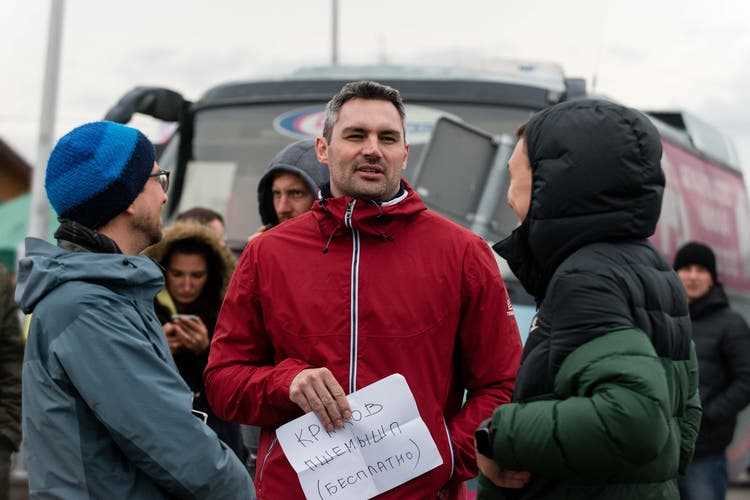
“The least we can do.” Dimitri Galai (right) and Valeri Bogdanov (centre) drive refugees to Kraków in their private cars.
It is not surprising that representatives of the post-Soviet diaspora reacted particularly quickly to the crisis. The largest group is made up of Ukrainians, around 1.5 million of whom already live in Poland. Although their presence in the country goes back a long way, the Russian aggressions in Crimea and Donbass in 2014 caused the numbers to explode. The many relatives and friends are now the magnet that makes Poland the logical destination for the refugees.
20 kilometers on foot with a small child
Katerina Kosar and her family are already on their way to Posen (Poznan) at the weekend, where her uncle will pick them up and take them to Denmark for the time being. But not everyone has such clear plans: at the border crossing, in front of an improvised food stand, Galina, who works in Poland, picked up her friend Irina and her little girl. They come from Ternopil and don’t want to read their last name in the newspaper. “My daughter and I walked 20 kilometers to the border because we couldn’t drive the car in the kilometer-long traffic jam,” Irina describes her escape and takes another sip of coffee. “Then we waited in line for 10 hours.”
“Chaos and panic” are the words that come to mind when describing the situation in her western Ukrainian hometown. Now she is looking forward to a warm place to stay. But she neither knows how to proceed nor how to explain to her daughter what is happening in Ukraine. “She always asks what’s up with the kindergarten now,” says Irina, looking through a veil of tears at the heavily wrapped up girl who is holding a yellow Sünneli stuffed animal in her hand.
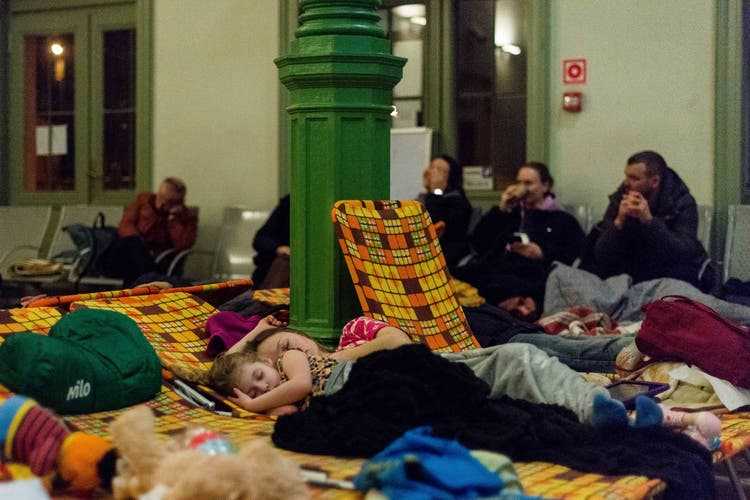
The situation in Przemysl main station has been deteriorating since Friday evening.
Behind the two, thousands more stand in the cold on the Ukrainian side of the border. The situation worsened again on Saturday, after many siren alarms, nervousness in western Ukraine is high. People from Africa and Bangladesh, some of whom studied in Lviv, but others who turned up suddenly in large numbers, also report discrimination by Ukrainian border guards. The mood has become hectic, the celebration has given way to tension.
This can also be felt at the train station: the bunks in the rearmost room are occupied to the last seat, people are sitting, sleeping, phoning and crying everywhere. On Saturday, the mayor has to close the station for journalists because the rush has simply become too much. Eight trains are to bring 1,000 more people to Przemysl.
This could be just the beginning: If the situation in Ukraine continues to escalate, UNHCR expects up to 4 million people to flee the country.
